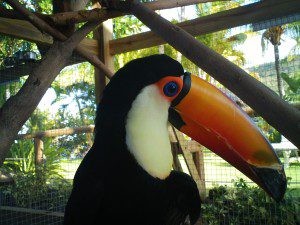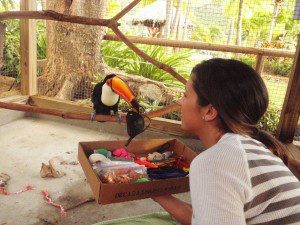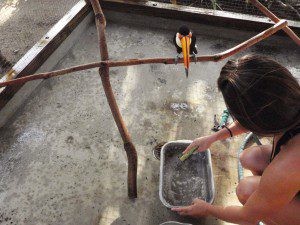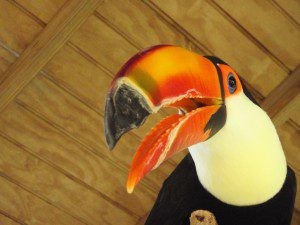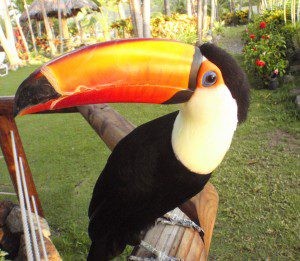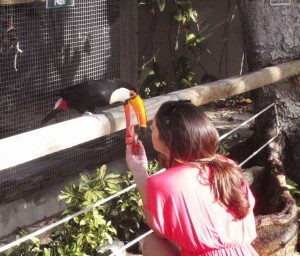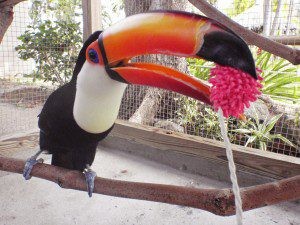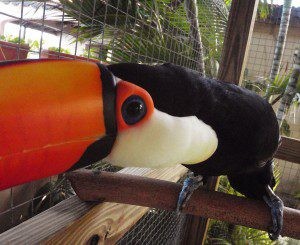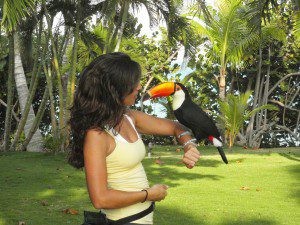Are Toucans Good Pets? Understanding the joys and responsibilities of toucan companionship is essential before bringing one of these vibrant birds into your home. At PETS.EDU.VN, we aim to provide you with a detailed look at what toucan ownership entails, covering everything from their unique dietary needs to their social and spatial requirements. By exploring these fascinating creatures, you can make an informed decision about whether a toucan is the right pet for you. Consider their long-term care, temperament, and whether your lifestyle can accommodate such an exotic pet bird.
1. Understanding the Allure and Reality of Toucan Ownership
Toucans, with their striking colors and playful personalities, captivate the hearts of many animal lovers. However, beyond their vibrant appearance, prospective owners must understand the full scope of what it means to care for these exotic birds. Toucans are not domesticated animals; they have specific needs that differ significantly from those of more common pets like dogs or cats. At PETS.EDU.VN, we emphasize responsible pet ownership, providing detailed information and resources to help you make informed decisions.
1.1. The Initial Charm vs. Long-Term Commitment
The initial allure of owning a toucan often stems from their unique appearance and engaging behavior. Their large, colorful beaks and lively antics make them stand out. However, it’s crucial to look beyond the surface. Owning a toucan is a long-term commitment, with these birds living an average of 20 to 25 years. This longevity means that you must be prepared to provide consistent care and attention for decades.
1.2. Meeting Toucans’ Specific Needs
Toucans have specific dietary, spatial, and social needs. They require a specialized diet rich in fresh fruits and low-iron pellets, a spacious enclosure to accommodate their active nature, and regular social interaction to prevent boredom and stress. Failing to meet these needs can lead to health issues and behavioral problems. Proper preparation and dedication are essential for ensuring a toucan’s well-being in captivity.
1.3. Importance of Responsible Ownership
At PETS.EDU.VN, we advocate for responsible pet ownership, stressing the significance of understanding and meeting the unique requirements of exotic animals like toucans. Responsible ownership includes researching their natural behaviors, dietary needs, and environmental requirements. It also means being prepared for the financial and time commitments involved in providing proper care. This approach ensures that both the pet and the owner can enjoy a fulfilling and healthy relationship.
2. Time Commitment: A Toucan’s Daily Demands
Caring for a toucan demands a significant time investment each day. Unlike more independent pets, toucans require consistent attention and care to thrive. From preparing fresh meals to cleaning their enclosures and providing social interaction, the daily demands of toucan ownership can be substantial. Understanding these demands is crucial for anyone considering bringing a toucan into their home.
2.1. Daily Feeding Schedule
Toucans need to be fed fresh fruit twice a day. This isn’t as simple as pouring kibble into a bowl. It involves selecting a variety of fruits, chopping them into bite-sized pieces, and ensuring they are free from pesticides and other harmful substances. This preparation can take a significant amount of time, especially when aiming for a balanced and nutritious diet.
2.2. Maintaining Hygiene
Toucans are messy eaters and have a rapid metabolism, leading to frequent droppings. Cleaning their enclosure daily is essential to maintain a hygienic environment and prevent the spread of diseases. This task involves removing food debris, cleaning perches, and disinfecting surfaces, which can be time-consuming.
2.3. Social Interaction
Toucans are social birds that require regular interaction to stay mentally stimulated and emotionally healthy. They need playtime, attention, and engagement with their owners to prevent boredom and loneliness. This social interaction can take several hours each day, depending on the toucan’s individual needs and personality.
2.4. Example Daily Schedule
| Time | Activity | Duration |
|---|---|---|
| 7:00 AM | Prepare and serve the first fruit meal | 30-45 minutes |
| 8:00 AM | Clean the enclosure | 30-45 minutes |
| 9:00 AM – 12:00 PM | Social interaction and playtime | 2-3 hours |
| 12:00 PM | Monitor and spot clean as needed | 15 minutes |
| 4:00 PM | Prepare and serve the second fruit meal | 30-45 minutes |
| 5:00 PM | Additional social interaction and enrichment | 1-2 hours |
| 7:00 PM | Final cleanup for the day | 15-30 minutes |
2.5. Professional Help and PETS.EDU.VN
For busy individuals, enlisting the help of a professional pet sitter or avian specialist may be necessary. PETS.EDU.VN can connect you with qualified caregivers who understand the specific needs of toucans. This ensures that your bird receives the care and attention it needs, even when you are unable to provide it yourself. Consider visiting our site for resources on professional pet care.
3. Financial Implications: The Cost of Toucan Care
Toucans are expensive pets. The initial cost of purchasing a toucan can be substantial, often reaching several thousand dollars. However, the ongoing expenses of caring for a toucan are equally significant. From specialized food and toys to veterinary care and enclosure maintenance, the financial implications of toucan ownership should not be underestimated.
3.1. Initial Purchase Price
The cost of acquiring a toucan varies depending on the species, age, and breeder. Toco toucans, for example, are among the most expensive, often costing upwards of $10,000. Other species may be more affordable, but it’s essential to research reputable breeders and ensure the bird is healthy and well-adjusted before making a purchase.
3.2. Ongoing Food Costs
Toucans require a constant supply of fresh, high-quality fruit. They often prefer exotic and expensive options like mangoes, papayas, and berries. Additionally, they need specially formulated low-iron pellets to prevent iron storage disease, a common health issue in toucans. These dietary needs can result in significant monthly food costs.
3.3. Enrichment and Toys
Toucans are intelligent and active birds that need a variety of toys and enrichment items to prevent boredom. These toys can be costly, and toucans tend to destroy them quickly, necessitating frequent replacements. Providing a stimulating environment is crucial for their mental and physical well-being.
3.4. Veterinary Care
Toucans require regular veterinary checkups and vaccinations to maintain their health. Avian veterinarians with experience treating toucans can be hard to find, and their services may be more expensive than those for more common pets. Additionally, toucans are susceptible to specific health issues like iron storage disease, which can require ongoing monitoring and treatment.
3.5. Housing and Enclosure
Toucans need a spacious and secure enclosure to accommodate their active nature. Whether housed indoors or outdoors, the enclosure must be large enough to allow them to fly and move around freely. Constructing or purchasing such an enclosure can be a significant expense.
3.6. Estimated Annual Costs
| Expense | Estimated Annual Cost |
|---|---|
| Food | $2,000 – $4,000 |
| Toys and Enrichment | $500 – $1,000 |
| Veterinary Care | $500 – $2,000 |
| Enclosure Maintenance | $200 – $500 |
| Total | $3,200 – $7,500 |
3.7. PETS.EDU.VN Resources
PETS.EDU.VN offers resources and advice on budgeting for exotic pets like toucans. We can help you find affordable options for food, toys, and veterinary care, ensuring you can provide the best possible care for your toucan without breaking the bank. Consider visiting our site for cost-saving tips and recommendations.
4. Spatial Requirements: Creating the Right Environment
Toucans need ample space to thrive. They are active birds that spend much of their time hopping, flying, and exploring their surroundings. Providing an adequately sized enclosure is crucial for their physical and mental well-being. Whether housed indoors or outdoors, the enclosure should allow them to express their natural behaviors and prevent boredom and stress.
4.1. Enclosure Size
The size of the enclosure depends on the species of toucan, but generally, larger is better. A good rule of thumb is to provide an enclosure that is at least twice the bird’s wingspan in width, depth, and height. This allows them to fly short distances and move around comfortably.
4.2. Indoor vs. Outdoor Housing
Toucans can be housed indoors or outdoors, depending on the climate and available space. Outdoor aviaries provide more natural light and ventilation but must be secure and protected from predators and extreme weather conditions. Indoor enclosures offer more controlled environments but require adequate lighting and ventilation.
4.3. Perches and Climbing Structures
Toucans need a variety of perches and climbing structures within their enclosure. These can include natural branches, ropes, and ladders. Providing different textures and diameters of perches helps to exercise their feet and prevent foot problems.
4.4. Enrichment Items
In addition to perches and climbing structures, toucans need enrichment items to keep them mentally stimulated. These can include toys, puzzles, and foraging devices. Rotating these items regularly helps to prevent boredom and encourages natural behaviors.
4.5. Ideal Enclosure Setup
| Feature | Description | Benefit |
|---|---|---|
| Size | At least twice the bird’s wingspan | Allows for flight and movement |
| Location | Secure from predators and weather | Ensures safety and comfort |
| Perches | Variety of textures and diameters | Exercises feet and prevents foot problems |
| Enrichment Items | Toys, puzzles, foraging devices | Keeps the bird mentally stimulated |
| Natural Light | Exposure to sunlight | Promotes vitamin D production |
| Ventilation | Good airflow | Prevents respiratory problems |
4.6. PETS.EDU.VN Enclosure Guides
PETS.EDU.VN offers detailed guides on creating the ideal enclosure for your toucan. We provide information on choosing the right materials, designing a safe and stimulating environment, and maintaining the enclosure to ensure your bird’s health and well-being. Check our resources for expert advice on creating the perfect habitat.
5. Mess and Cleanliness: Managing the Toucan’s Habits
Toucans are known for being messy pets. Their rapid metabolism and fruit-based diet lead to frequent droppings, and they often fling food around their enclosure while eating. Managing this mess is a crucial aspect of toucan ownership. Owners must be prepared to clean their bird’s enclosure daily and take measures to minimize the mess in their home.
5.1. Frequent Droppings
Toucans have a fast metabolism, which means they eat and eliminate frequently. Their droppings can be watery and messy, requiring frequent cleaning. Spot cleaning throughout the day and a thorough cleaning each evening is essential.
5.2. Food Flinging
Toucans often fling pieces of fruit around their enclosure while eating. This behavior is natural but can create a significant mess. Providing food in smaller portions and using feeders designed to minimize spillage can help reduce the mess.
5.3. Stain Potential
Certain fruits, such as berries, can stain surfaces and fabrics. Protecting furniture and flooring with washable covers and cleaning up spills immediately can help prevent permanent stains.
5.4. Cleaning Strategies
| Area | Cleaning Frequency | Cleaning Method |
|---|---|---|
| Enclosure | Daily | Remove food debris, disinfect surfaces |
| Surrounding Area | Daily | Sweep or vacuum up dropped food |
| Furniture/Flooring | As needed | Clean spills immediately |
| Food Bowls | Daily | Wash with soap and water |
5.5. Minimizing Mess
- Use appropriate feeders: Choose feeders that minimize spillage and prevent the bird from flinging food.
- Provide smaller portions: Offering smaller portions of food can reduce the amount that ends up on the floor.
- Protect surfaces: Use washable covers and mats to protect furniture and flooring from stains.
- Regular cleaning: Establish a daily cleaning routine to manage the mess and prevent odors.
5.6. PETS.EDU.VN Cleaning Tips
PETS.EDU.VN offers tips and product recommendations for managing the mess associated with toucan ownership. We can help you find effective cleaning solutions and strategies to keep your home clean and hygienic while providing the best possible care for your bird. Browse our articles for practical advice.
6. Training Challenges: Patience and Consistency
Toucans can be challenging to train due to their high energy levels and short attention spans. Unlike parrots, who are known for their trainability, toucans require a great deal of patience and consistency. However, with the right approach, owners can successfully train their toucans to perform basic commands and behaviors.
6.1. Attention Span
Toucans have a limited attention span, making it difficult to hold their focus for extended periods. Training sessions should be short and frequent, focusing on one specific behavior at a time.
6.2. Positive Reinforcement
Positive reinforcement is the most effective training method for toucans. Rewarding desired behaviors with treats, praise, or toys encourages the bird to repeat those behaviors. Avoid punishment, as it can damage your relationship with your toucan and lead to fear and aggression.
6.3. Consistency
Consistency is key to successful toucan training. Use the same commands and cues each time you train, and be consistent with your rewards. This helps the toucan understand what you expect of them and makes the training process more effective.
6.4. Training Goals
- Recall: Training your toucan to come to you on command is essential for safety and control.
- Targeting: Teaching your toucan to touch a target with its beak can be used to guide it to different locations.
- Stationing: Training your toucan to stay in a specific location, such as a perch, can be useful for vet visits and cleaning.
6.5. Sample Training Session
| Step | Action | Reward |
|---|---|---|
| 1 | Hold a target near the toucan | None |
| 2 | When the toucan touches the target with its beak | Give a treat and praise |
| 3 | Repeat steps 1 and 2 several times | Continue giving treats and praise |
| 4 | Gradually increase the distance to the target | Maintain positive reinforcement |
6.6. PETS.EDU.VN Training Resources
PETS.EDU.VN offers detailed guides on training toucans, including step-by-step instructions and tips for success. We can help you develop a training plan that works for you and your bird, ensuring a positive and rewarding experience. Visit our training section for expert advice.
7. Untamed Nature: Accepting Instinctual Behaviors
Toucans are not domesticated animals. They still possess many of their natural instincts and behaviors. Owners must be prepared to accept these behaviors, even if they are sometimes challenging or inconvenient. Understanding and accommodating a toucan’s untamed nature is crucial for creating a harmonious relationship.
7.1. Wild Spirit
Toucans retain a wild spirit, often displaying behaviors that are different from those of domesticated pets. They may be more independent, less cuddly, and more prone to destructive behaviors.
7.2. Hormonal Behaviors
During the breeding season, toucans can exhibit hormonal behaviors such as increased aggression, territoriality, and vocalization. These behaviors can be challenging to manage, but understanding their cause can help owners respond appropriately.
7.3. Natural Instincts
Toucans have natural instincts such as foraging, preening, and roosting. Providing opportunities for these behaviors within their enclosure can help them feel more comfortable and secure.
7.4. Managing Untamed Behaviors
- Provide enrichment: Offering a variety of toys and activities can help redirect destructive behaviors.
- Create a routine: Establishing a consistent daily routine can help reduce stress and anxiety.
- Understand hormonal cycles: Be aware of the signs of hormonal behavior and adjust your approach accordingly.
7.5. Expectations
| Behavior | Expectation | Management Strategy |
|---|---|---|
| Destructiveness | Chewing and destroying toys | Provide durable toys and rotate them regularly |
| Vocalization | Loud calls and squawks | Provide a quiet space for rest |
| Aggression | Biting or lunging during breeding season | Increase space and reduce handling |
| Territoriality | Defending their enclosure | Avoid entering the enclosure during displays |
7.6. PETS.EDU.VN Behavior Guides
PETS.EDU.VN offers detailed guides on understanding and managing toucan behavior. We provide insights into their natural instincts, hormonal cycles, and common behavioral problems, helping you create a supportive and enriching environment for your bird. Explore our behavior resources for expert advice.
8. Limited Caregivers: Finding Reliable Support
Finding someone willing and able to care for a toucan in your absence can be difficult. Toucans require specialized care and attention that many people are not comfortable providing. Owners must plan and make arrangements for their toucan’s care well in advance of any travel or absences.
8.1. Specialized Knowledge
Toucans need caregivers with specialized knowledge of their dietary, spatial, and social needs. This knowledge is not common, making it challenging to find qualified pet sitters.
8.2. Time Commitment
Caring for a toucan requires a significant time commitment each day. Many people are not willing or able to dedicate the necessary time to properly care for a toucan, even for a short period.
8.3. Trust and Reliability
Entrusting your toucan to someone else requires a high level of trust and reliability. You need to be confident that the caregiver will follow your instructions and provide the best possible care for your bird.
8.4. Finding Caregivers
- Avian Veterinarians: Your avian veterinarian may be able to recommend qualified pet sitters with experience caring for toucans.
- Bird Clubs: Local bird clubs can be a valuable resource for finding experienced toucan owners who may be willing to provide pet-sitting services.
- Professional Pet Sitters: Some professional pet-sitting services specialize in caring for exotic animals like toucans.
8.5. Preparing a Care Plan
- Detailed Instructions: Provide the caregiver with detailed instructions on your toucan’s diet, enclosure maintenance, and social needs.
- Emergency Contacts: Provide the caregiver with contact information for your avian veterinarian and other emergency contacts.
- Backup Plan: Have a backup plan in case the primary caregiver becomes unavailable.
8.6. PETS.EDU.VN Caregiver Resources
PETS.EDU.VN can connect you with qualified pet sitters and avian specialists in your area. We also offer resources for creating a detailed care plan for your toucan, ensuring that your bird receives the best possible care in your absence. Explore our pet-sitting directory for reliable caregivers.
9. Social Isolation: Addressing Misunderstandings
Owning a toucan can sometimes lead to social isolation. Many people do not understand the unique challenges and rewards of toucan ownership. This can lead to misunderstandings and a lack of support from friends and family.
9.1. Lack of Understanding
Toucans are not as common as dogs or cats, so many people do not understand their needs and behaviors. This can lead to judgments and criticisms about your choice to own a toucan.
9.2. Time Constraints
Caring for a toucan requires a significant time commitment, which can limit your ability to socialize with friends and family. You may have to decline invitations or cut back on activities to provide proper care for your bird.
9.3. Lifestyle Adjustments
Owning a toucan can require significant lifestyle adjustments. You may have to rearrange your home, adjust your schedule, and make sacrifices to accommodate your bird’s needs.
9.4. Building a Support Network
- Online Communities: Join online forums and social media groups for toucan owners to connect with like-minded individuals.
- Bird Clubs: Local bird clubs can provide opportunities to meet other bird enthusiasts and share experiences.
- Educate Others: Take the time to educate your friends and family about toucans and the joys of toucan ownership.
9.5. Open Communication
- Explain Your Needs: Communicate your needs and limitations to your friends and family.
- Invite Them Over: Invite your friends and family over to meet your toucan and learn more about them.
- Share Your Experiences: Share your positive experiences and the joys of toucan ownership with others.
9.6. PETS.EDU.VN Community Forum
PETS.EDU.VN hosts a community forum where toucan owners can connect with each other, share experiences, and offer support. Join our community to find understanding and encouragement from fellow toucan enthusiasts.
10. Emotional Burden: Addressing Feelings of Guilt
Toucans are wild animals living in captivity, which can evoke feelings of guilt and conflict in some owners. It’s normal to question whether you are providing the best possible life for your toucan and to feel sadness about their limited freedom. Acknowledging and addressing these feelings is crucial for your well-being and the well-being of your bird.
10.1. Confined Environment
Toucans are meant to fly freely in their natural habitat, but as pets, they are confined to an enclosure. This can lead to feelings of guilt about restricting their natural behaviors.
10.2. Limited Stimulation
Even with the best efforts, it can be challenging to provide the same level of stimulation and enrichment that toucans would experience in the wild. This can lead to feelings of inadequacy and concern about their mental well-being.
10.3. Unnatural Diet
While owners strive to provide a nutritious diet, it is impossible to perfectly replicate the toucan’s natural diet in captivity. This can lead to feelings of guilt about not meeting their nutritional needs.
10.4. Addressing Guilt
- Provide Enrichment: Focus on providing the best possible environment and enrichment to minimize feelings of guilt.
- Support Conservation: Support toucan conservation efforts in the wild to help protect their natural habitat.
- Educate Yourself: Continue to educate yourself about toucan care and behavior to provide the best possible care for your bird.
10.5. Focus on Positives
- Improved Quality of Life: Remind yourself that you are providing a safe and loving home for your toucan, with access to food, shelter, and veterinary care.
- Companionship: Appreciate the companionship and joy that your toucan brings to your life.
- Educational Opportunity: Recognize that owning a toucan provides an opportunity to educate others about these amazing birds and their conservation needs.
10.6. PETS.EDU.VN Emotional Support Resources
PETS.EDU.VN offers resources for addressing the emotional challenges of toucan ownership. We provide articles and support forums where you can connect with other owners, share your feelings, and find encouragement and advice. Visit our emotional support section for helpful resources.
11. Health Concerns: Managing Potential Illnesses
Toucans are susceptible to a variety of health problems, including iron storage disease, respiratory infections, and nutritional deficiencies. Owners must be proactive in monitoring their bird’s health and seeking veterinary care at the first sign of illness.
11.1. Iron Storage Disease
Iron storage disease (hemochromatosis) is a common and potentially fatal condition in toucans. It occurs when the bird’s body stores excessive amounts of iron, leading to organ damage.
11.2. Respiratory Infections
Toucans are susceptible to respiratory infections, especially in environments with poor ventilation or humidity.
11.3. Nutritional Deficiencies
Toucans require a specialized diet to meet their nutritional needs. Deficiencies in vitamins, minerals, or protein can lead to health problems.
11.4. Proactive Health Management
- Regular Checkups: Schedule regular checkups with an avian veterinarian experienced in treating toucans.
- Diet Monitoring: Carefully monitor your toucan’s diet to ensure they are receiving the proper nutrients.
- Environmental Control: Maintain a clean and well-ventilated environment to prevent respiratory infections.
11.5. Recognizing Symptoms
| Symptom | Potential Cause | Action |
|---|---|---|
| Lethargy | Illness, malnutrition | Consult an avian veterinarian |
| Loss of Appetite | Illness, stress | Monitor food intake and consult a vet |
| Difficulty Breathing | Respiratory infection | Seek immediate veterinary care |
| Feather Plucking | Stress, boredom, malnutrition | Provide enrichment and consult a vet |
11.6. PETS.EDU.VN Health Guides
PETS.EDU.VN offers comprehensive health guides for toucans, including information on common diseases, prevention strategies, and treatment options. We can help you find qualified avian veterinarians and provide resources for monitoring your bird’s health. Visit our health section for expert advice.
12. Long-Term Commitment: Planning for the Future
Toucans live an average of 20 to 25 years, making them a long-term commitment. Owners must be prepared to provide consistent care and attention for the duration of their bird’s life. This includes planning for potential changes in your lifestyle, such as moving, changing jobs, or starting a family.
12.1. Lifetime Care
Owning a toucan is not a decision to be taken lightly. You are committing to providing care and attention for the next two decades or more.
12.2. Adapting to Changes
Your life will inevitably change over the next 20 years. You must be prepared to adapt your lifestyle to continue providing the best possible care for your toucan.
12.3. Financial Planning
You must be prepared to budget for your toucan’s food, toys, veterinary care, and enclosure maintenance for the duration of their life.
12.4. Future Planning
- Moving: Ensure that you have enough space for your toucan’s enclosure in any future homes.
- Career Changes: Consider how a change in your job or work schedule will affect your ability to care for your toucan.
- Family Planning: Plan how you will integrate your toucan into your family if you decide to have children.
12.5. Considerations
| Scenario | Planning Strategy |
|---|---|
| Moving | Research pet-friendly housing options |
| Career Change | Adjust your budget and schedule accordingly |
| Family Planning | Create a safe environment for children and birds |
| Health Issues | Have a backup plan for your toucan’s care |
12.6. PETS.EDU.VN Long-Term Care Resources
PETS.EDU.VN offers resources for planning for the long-term care of your toucan. We can help you create a care plan that addresses potential challenges and ensures that your bird receives the best possible care for the duration of their life. Visit our long-term care section for expert advice.
13. The Joys of Toucan Ownership: A Rewarding Experience
Despite the challenges, owning a toucan can be a rewarding experience. Toucans are intelligent, playful, and affectionate birds that can bring joy and companionship to their owners’ lives.
13.1. Unique Personality
Toucans have unique personalities and quirks that make them fascinating and engaging pets.
13.2. Playful Behavior
Toucans are playful and active birds that enjoy interacting with their owners and playing with toys.
13.3. Affectionate Companions
Toucans can form strong bonds with their owners and become affectionate companions.
13.4. Positive Aspects
| Benefit | Description |
|---|---|
| Companionship | Provide love and affection |
| Entertainment | Offer endless amusement and entertainment |
| Cognitive Stimulation | Keep you mentally engaged and active |
| Unique Experience | Provide a unique and rewarding pet ownership experience |
13.5. Is a Toucan Right for You?
Deciding whether to own a toucan is a personal decision that depends on your lifestyle, resources, and commitment. Consider the challenges and rewards carefully before making a decision.
13.6. Visit PETS.EDU.VN for More Information
At PETS.EDU.VN, we are dedicated to providing comprehensive and reliable information about toucan ownership. Visit our website for detailed guides, expert advice, and community support. Make an informed decision and prepare yourself for the unique challenges and rewards of owning a toucan.
14. Conclusion: Making an Informed Decision
Deciding whether or not to bring a toucan into your life is a significant decision that requires careful consideration. These exotic birds are not for everyone, and it’s essential to weigh the joys of toucan companionship against the considerable responsibilities involved. At PETS.EDU.VN, we encourage potential owners to thoroughly research toucan care, understand the financial and time commitments, and assess their ability to provide a suitable environment.
Ultimately, a well-informed decision will lead to a happier life for both you and your toucan. For further information and expert guidance, please visit PETS.EDU.VN.
Contact Us:
- Address: 789 Paw Lane, Petville, CA 91234, United States
- WhatsApp: +1 555-987-6543
- Website: PETS.EDU.VN
Frequently Asked Questions (FAQs)
1. What is the average lifespan of a toucan?
Toucans typically live for 20 to 25 years, depending on the species and quality of care.
2. How much does it cost to buy a toucan?
The price of a toucan varies depending on the species, but expect to pay anywhere from $5,000 to $10,000 or more for a Toco toucan.
3. What do toucans eat?
Toucans primarily eat fresh fruits and require a specialized low-iron pellet diet to prevent iron storage disease.
4. Do toucans require a lot of space?
Yes, toucans are active birds and need a spacious enclosure to fly and move around comfortably.
5. Are toucans messy pets?
Yes, toucans are known for being messy due to their fruit-based diet and rapid metabolism.
6. Can toucans be trained?
Toucans can be trained with patience and positive reinforcement, but they have a shorter attention span than parrots.
7. Are toucans good with children?
Toucans can be good with children if properly socialized, but supervision is always necessary.
8. What are some common health problems in toucans?
Common health problems in toucans include iron storage disease, respiratory infections, and nutritional deficiencies.
9. How do I find a veterinarian who specializes in toucans?
Ask your local avian veterinarian for recommendations or search online for avian specialists in your area.
10. Where can I find more information about toucan care?
Visit pets.edu.vn for comprehensive guides, expert advice, and community support for toucan owners.
